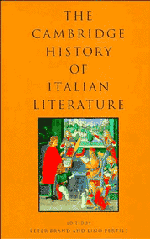Book contents
- Frontmatter
- Origins and Duecento
- The Trecento
- The Quattrocento
- The Cinquecento
- The Seicento: Poetry, Philosophy and Science
- Narrative prose and theatre
- The Settecento
- The Age of Romanticism (1800–1870)
- The Literature of United Italy (1870–1910)
- The Rise and Fall of Fascism (1910–45)
- 36 Poetry and the avant-garde
- 37 Philosophy and literature from Croce to Gramsci
- 38 The novel
- The Aftermath of the Second World War (1945–56)
- Contemporary Italy (since 1956)
- Bibliography
37 - Philosophy and literature from Croce to Gramsci
from The Rise and Fall of Fascism (1910–45)
Published online by Cambridge University Press: 28 March 2008
- Frontmatter
- Origins and Duecento
- The Trecento
- The Quattrocento
- The Cinquecento
- The Seicento: Poetry, Philosophy and Science
- Narrative prose and theatre
- The Settecento
- The Age of Romanticism (1800–1870)
- The Literature of United Italy (1870–1910)
- The Rise and Fall of Fascism (1910–45)
- 36 Poetry and the avant-garde
- 37 Philosophy and literature from Croce to Gramsci
- 38 The novel
- The Aftermath of the Second World War (1945–56)
- Contemporary Italy (since 1956)
- Bibliography
Summary
The literary and ideological quarrels of this period were disputed in numerous reviews and literary magazines. By far the most important of these was La critica (1903–44), edited and directed by Benedetto Croce. In its pages, Croce carried forward his struggle against positivism and empiricism, establishing his reputation as Italy's greatest modern philosopher and as the intellectual and moral rallying point for anti-Fascist intellectuals. In spite of La critica's vast influence, however, Crocian neo-idealism, with its foundation of reason and hierarchy and its staunch defence of liberal democracy, did not satisfy the needs of younger intellectuals, who, removed as they were from the sources of political power, sought more radical answers. Leonardo (1903–7) and La Voce (1908–16), the reviews which best reflect the climate of turbulent intellectual upheaval that characterised Italian society in the period prior to the Great War, provided a forum for the dissemination of several varieties of European irrationalism. The Triestine Scipio Slataper (1888–1915) was one of the contributors to La Voce whose idealism cost him his life at the front. From the pages of La Ronda (1919–23), Riccardo Bacchelli (1891–1985), called for a return to classical ideals in literature and art, in opposition to the vanguardism of Lacerba (1913–15); while Piero Gobetti's Energie nove (1918–20) and La rivoluzione liberale (1922–5) championed a working-class revolution based on liberal-democratic principles, and L'ordine nuovo (1919–25), founded by Antonio Gramsci, appealed to Marxist notions of class struggle in an attempt to unite intellectuals and proletariat in the battle against capitalism.
- Type
- Chapter
- Information
- The Cambridge History of Italian Literature , pp. 509 - 514Publisher: Cambridge University PressPrint publication year: 1997



